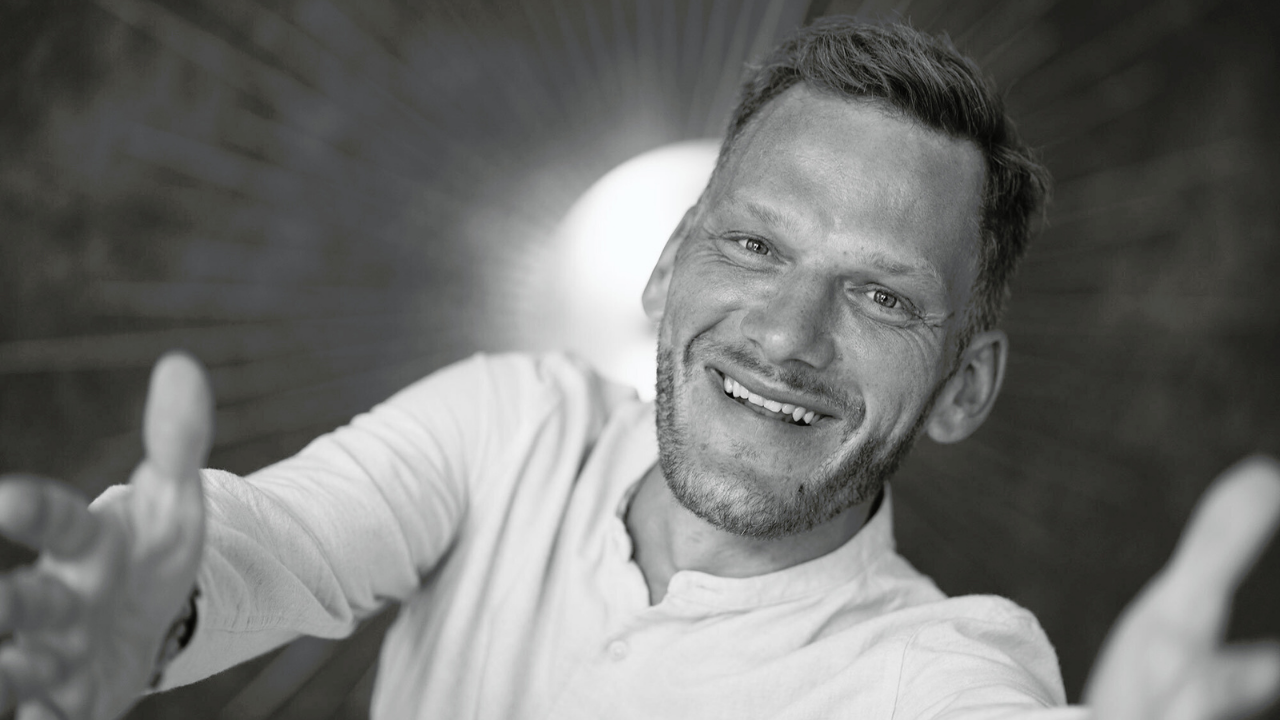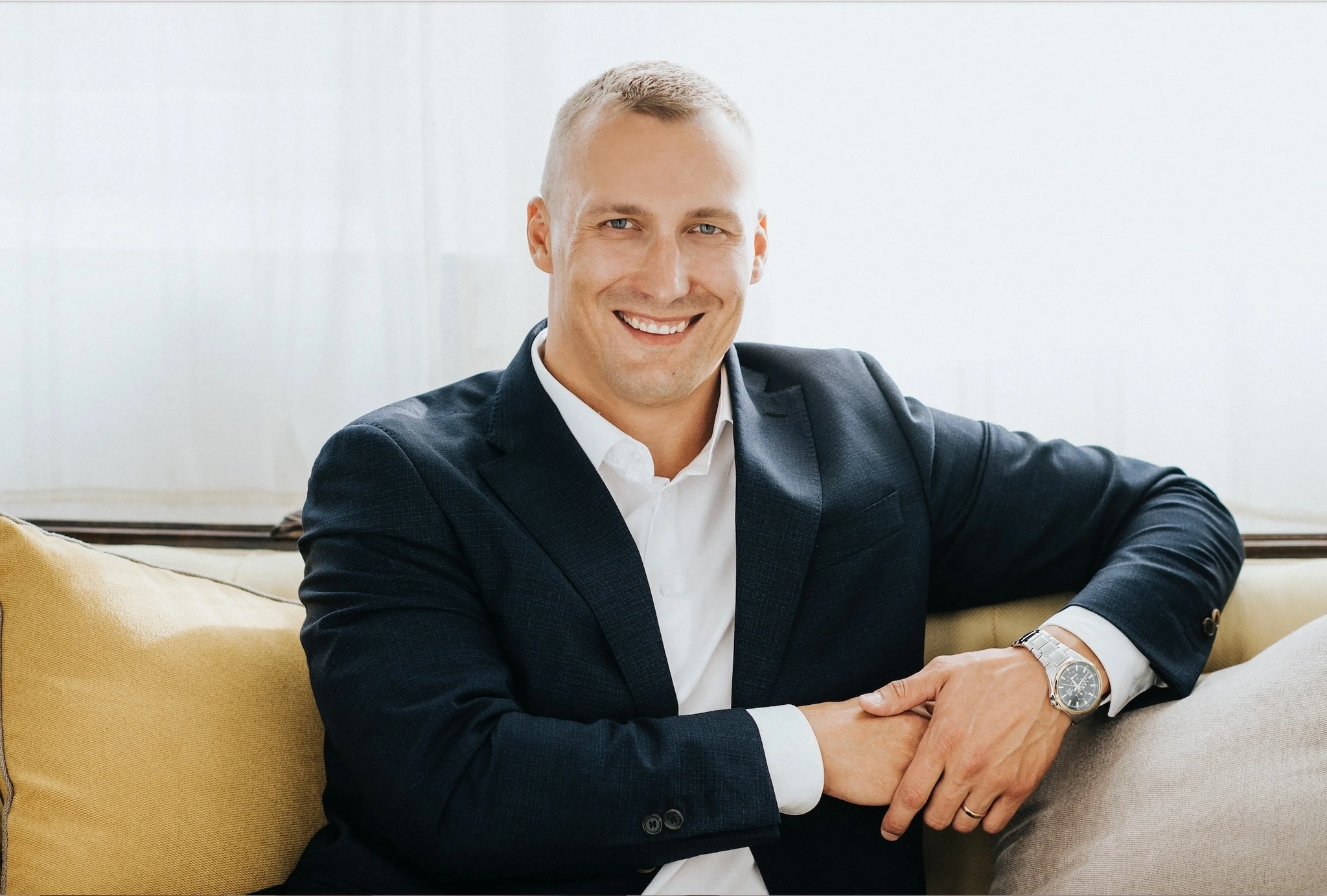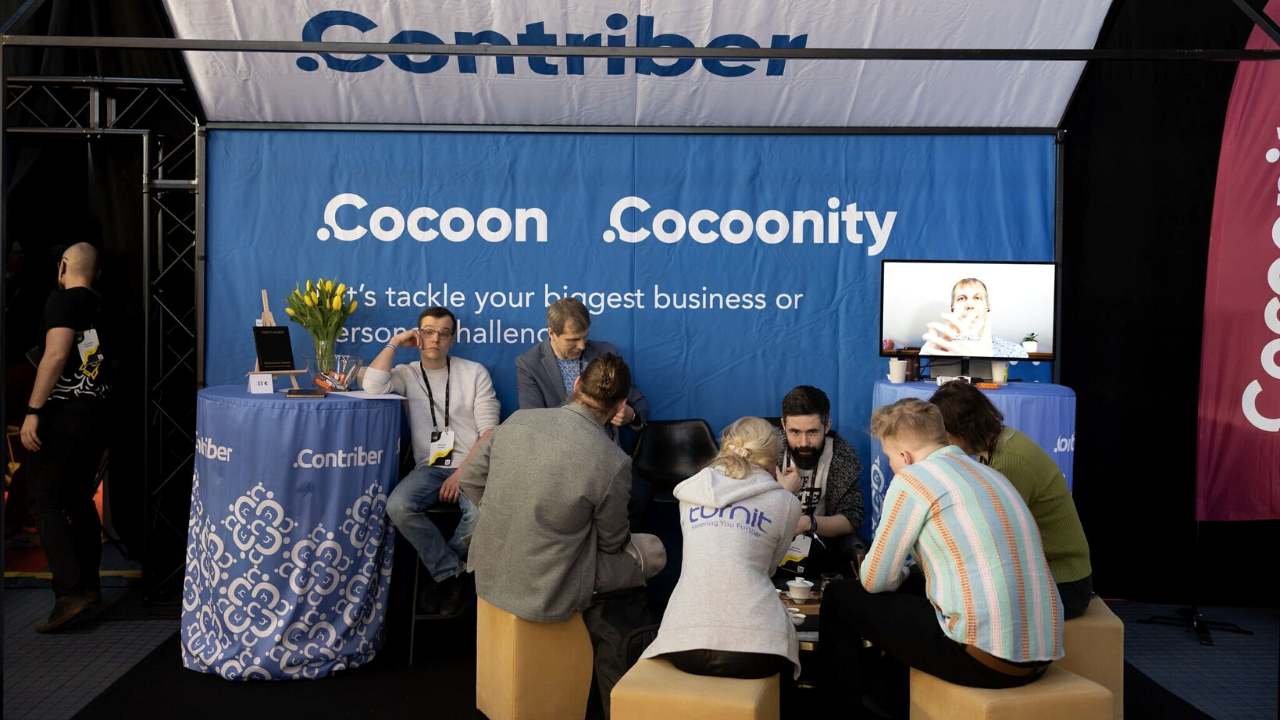
Marcel Gasser: "It's impossible to get to know who you truly are without meditation."
Marcel Gasser is an entrepreneurial nomad, business angel and mentor who helps entrepreneurs and investors in becoming fully aligned with their purpose, clarity, and joy. His interview for the sTARTUp Day blog will provide a good motivation boost for anyone looking for a fresh start in 2022. Read on to learn about Marcel's take on productivity, digital addiction, and the path to happiness, among other topics.
This interview was written by Rene Rumberg, member of the sTARTUp Day Marketing & PR team.
You used to be an entrepreneur and are now helping entrepreneurs as a mentor, focused on self-development. What are the top three most critical mental skills that every founder should possess?
I would say the art of doing nothing, clarity, and trust. Everything else is a side product. Once you are clear and trust your abilities, skills, or your path, then whatever needs to come in your way will happen, and the rest will follow. So I think I love the simple stuff.
I agree with you that the art of doing nothing is essential because when you're constantly busy, it is counterproductive, and in the end, you will get nothing done.
Yes. Our minds are constantly busy. With meditation or other stuff, you have a place to escape, even if it's for 15 minutes every day. These mental skills of focusing on nothing or the inside rather than the outside are essential because we are living too much in the outer world, which causes stress, confusion, and too many expectations.
For the past few years, we've all heard about how technology has made us more self-centered and broken our mental health, but instead of the negative, I would like to focus on the positive. Have those new technologies done anything good to our well-being and mental health, in your opinion?
The technology, for me, is almost neutral. The most important thing is that you control the technology you're using, not the other way around. Yes, we're addicted. I'm also addicted to my mobile phone, that's for sure, but I don't see it as a negative thing. It's just how it is. I also have the 'first and last hour of the day' rule, where I don't use any means of communication, which means that I am not on my phone.
I see things generally very positively, but you need to have a certain distance or a good relationship with technology.
Of course, we depend on technology, and it's a lie if we say we don't. If my computer gets stolen here in Thailand, I'm screwed. I could also get 50% of my work done using a smartphone, which was unthinkable ten years ago.
Technology has increased possibilities in terms of connectivity or connecting with people. It doesn't mean it can replace the physical connections, which have dropped during Covid-19 and where we have a significant lack of physical interaction between human beings. However, I still feel super connected with people I haven't seen for two years physically because of technology, and without technology, it would be impossible.
How has your approach, where you don't use any means of communications and technology during the first and last hour of the day, improved your life or well-being?
Mornings are especially sacred for me. I need two hours by myself. I'm not doing any crazy practices, but it's more like following the monk style ‒ I flow those two hours and do whatever I like to do, but I don't want calls and get the phone into my bed. That's really a no-go. The phone can be very destructive for the following three C's ‒ clarity, confidence, and calmness.
For example, before going to bed, I never make calls, and then I see other people who have finished a call trying to get to sleep. It's impossible because your thoughts will be in the wrong environment. I only use a very old iPad without communication apps in bed to read eBooks or listen to podcasts. Those are the only two things I do before sleep.
So the time before and after sleep is really important. It's a sacred space.
Going inside and not being focused on the outside just before going to sleep is key - the same when you wake up. Also, when you have a partner, try to be in silence or give each other space needed. Make it a ritual.
We seem obsessed with productivity these days. Yet while we have tons of tools and hacks for being more productive, many people are still lost on track and struggling? What are we doing wrong?
I have read the book called 'Perform', co-authored by Stoyan Yankov and Cristobal Alonso, the CEO of Startup Wise Guys, and they're good in their assumptions. My saying is that the basic things we all look for are control, recognition, and security. If you want to have one of those things, you'll never have it. Unless you let go of the urge to have those things, you will never have them. That's why you have to let it go.
The same goes for productivity. If I always drive for productivity, I will never be productive. I was never as productive as today, but productiveness doesn't mean anything to me. I call productiveness an effortless success. It means I allow things to happen or to unfold because I trust the process ‒ I trust that I will be meeting the right people, getting the money, customers, and everything needed to grow my business.
Productivity hacks are like manifestation, and it kills the magic. When we have everything planned out, then how can the magic appear? It's good to have different daily practices; for example, I like to write a journal, physical exercise is also good, but you shouldn't become a machine. It's crazy what I see people advise other entrepreneurs...
Yeah, about 15% of the content on LinkedIn is about 'How I wake up at 4 AM, take a cold shower, go for a run for two hours, and then I start working…"
Exactly. I'm not too fond of cold showers, I know it's beneficial, but it's nothing for me. Life should be enjoyable, and if it's enjoyable for you to wake up at 4 AM, take cold showers, then I don't mind, but we cannot generalize.
It's about how we communicate. Communication for me is one of the biggest lessons learned out of those years of advising companies. It's the key. How you communicate determines how effective or productive you are. I would say that 75% of our tasks or interactions with other people are related to miscommunication, misalignment of expectations, values, and trust. So instead of productivity, it is about how to communicate effectively, internally and externally.
Surprisingly, a company in the US called HearthMath Institute is doing a lot of research on that particular topic. They found an internal gap in humans because the heart and brain are not being "coherent," which means synchronized or talking the same language. If there's confusion while I am talking to you currently, and your brain and heart are not aligned, we simultaneously have a miscommunication on three different levels. Even if you use the most productive tools, you can still create confusion.
If happiness is tied to following one's heart or serving others, how does one combine it with the need to make a living? Is there a moral conflict involved if you make money while helping others? Have you experienced it yourself?
My philosophy of life is that when I die, I will get the bill served for how true I was to my nature. Of course, I cannot go against the karmic principle and work on others, causing harm. I would say the moral question is even the other way around; if I'm not living the way I am meant to live in this life, then I'm destroying my loyalty or morals. It's not a financial question.
Financial success, or whatever is successful for you, will happen anyway once you identify your talent or passion.
Everybody has one specific skill that other people would pay for. There isn't a single person who has no talent. It doesn't matter what your talent is ‒ it could be cleaning something. I don't mind basic jobs if you do them with passion, and it can be a great way of improving the lives of others. It doesn't matter what you do.
A janitor who is mopping floors of the bank can be happier than the CEO who works for the bank?
Yes, exactly. I've met so many happy people. I'm currently here in Thailand, and I went to the hairdresser yesterday, we had a fantastic conversation. I admire everybody enjoying what they're doing, no matter how much you get paid for it, as long as you feel fulfillment.
While I do not advocate the usage of drugs, then let's talk about the trend we've seen taking off among tech executives. In 2019, GQ reported that Silicon Valley had found this new cool way to hack their productivity ‒
microdosing LSD, one of the most powerful psychoactive substances in the world. What are your thoughts on that?
It is a tool, and it can be a life shortcut. I do organize retreats for entrepreneurs on mushrooms or Ayahuasca and I've tried them all. In the end, I think I wouldn't call it a drug, as long as it has a natural source. But if it's an escape from your reality, it can be abusive because you want to escape the reality and go somewhere else, like with alcohol or other drugs.
Psychedelics show you a shortcut, but you have to work it out for yourself. It is not doing the work for you. It's a highly misconception that after you've done Ayahuasca, you'll be enlightened or have all the creativity from a few mushroom trips.
If you're curious and open, nature will show you the world that is beyond our physical reality. Without those substances, it's challenging to get on the same level, and feeling the connectivity towards nature or feeling the love so deeply is quite tricky. It can be achieved through meditation and breathwork, you can reach DMT excitement levels, but it takes a lot of work. That's why psychedelics are called shortcuts.
At a certain point, we don't need those substances anymore. I know many shamans or people who don't need it anymore since they can produce those experiences without external help. It's a game-changer and eye-opening.
One last thing. There are no bad trips. It's also a misconception. Nature doesn't want anything bad. If you have a bad trip, your ability to see your shadows is maybe not yet developed enough, or your level of acceptance is too low, the fear of the unknown is too high.
The whole trip and your experience is a reflection of yourself, about what is buried deep down inside of you, internally. So if you have a bad trip, then everything that you are experiencing comes from within you, it's not something terrible that is happening to you externally.
Yes, exactly. I would also say what is excellent with plant medicine or substances is letting go of the ego. You can experience how it is to be without ego. Especially for entrepreneurs, there are still a lot of egos, and the spiritual ego is even more significant than the normal ego. With plant medicine, you can get rid of your ego and create an ego-free space, which can be life-changing.
You mentioned ayahuasca retreats for entrepreneurs. Could you imagine a company where all stakeholders gather once a quarter in a circle deep in the jungle and perform shamanic rituals to share their emotions, concerns, ideas, and thoughts freely, without clashing egos and biased emotions like ancient tribes have done for thousands of years?
I believe we're going there. It sounds insane, but half of my business partners have done plant medicine experiments. They're open to trying mushrooms or Ayahuasca. I'm not saying that I'm only doing business with people who have done those things. Still, I would say at least I want to do business or engage with people who would be willing to be open to that journey and not say 'F*ck, it's a drug, I don't like it!' because then we need to talk about alcohol, which is a bigger problem than other stuff on this planet. I think openness is already enough.
So I would say that yes, in the companies I do business with, I would like to have this journey together to see how they're like while on substances and experience their shadows and lights. Because when being on the substance, you cannot hide; you are as pure as you are. It's like great due diligence on the people.
What about meditation? Should every manager, founder, CEO try meditating, and why?
If you genuinely want to learn more about yourself, and I think that's what life is about, it's not to live and materialize our physical world, but it's about discovering who we are. Sometimes one life is not enough, and it is impossible to get to know who you truly are without meditation.
In these moments, where the whole world is flipped upside down for many people, it can become like a space in the middle of the hurricane, where you sit and enjoy the quietness, while out of this space around you, everything (markets, politics, and drama) is spinning around, while you observe it from a distance.
Meditation means observation. There is a saying that observation is an act of creation through its limitation. When we start to observe, we kind of limitate. When I say 'This is a can,' it is a can. But maybe it's something else? That is kind of living the Matrix, where we are building our reality.
Without meditation, it is impossible to get to know yourself and maintain this calm state, which is so important at this moment.
A good example is if people say 'I try'. If you have a healthy body, try to stand up from sitting. Just try not to do it. So 'try' does not exist; either you do or you don't :-) Forget about 'I try my best'.
The third element is being in the center. You don't want to go to any extreme. That is also what is happening right now ‒ speeding up the left against the right, the right against the left, what religion and politicians did, etc. With meditation or the golden path, the middle way in the Buddhist tradition, you can focus on the zero point of gravity and have a peaceful life, no matter what is currently happening in the world.
I have one meditation called Twin Heart Meditation, 18 minutes every day. The beautiful thing is that you meditate for all other beings, not for yourself. It's ten times as effective if, instead, you'd meditate for yourself. But meditation for me can be anything ‒ sitting on a chair, having this conversation with you, meditation for me is like having a shower. When I feel energetically dirty, I meditate. But I don't have an obligation to meditate every morning at 4 AM. For me, this is already too strict.
The turn of the year is typically a time for reflection. What has been the most significant takeaway from your journey? In what ways did it make you more resilient?
We never forget that the world is still a miracle. When I arrived here in Thailand, I felt that it's still such a paradise. Nothing has changed in nature. If you go into the forest, nothing has changed. It's all the same, with or without Covid-19, media, etc. Most things come internally through our thoughts, belief systems, etc. We're still aware of what people we engage and about our thoughts and beliefs. The world is still a miracle and amazing place.
Secondly, we're living in very fragile moments. It is obvious. We're much more fragile than stable, but it doesn't matter. In nature, there's a saying, that god is: "Creation, operation, and destruction," but humans always tend to see destruction as something terrible. Or I would say fragility because maybe financial markets will crash, hyperinflation will hit, we will have civil war because of Covid-19. That is part of nature like fire is part of nature. Something new can be born afterward. So for me, the fragility of the system and being honest with it, that's maybe what I want to say. In the end, I can only relax on my chair and enjoy the whole show, and it makes things much easier.
One of my friends called me this morning, being very depressed, and said, "F*ck, how can I change the situation in Switzerland?! I'm going nuts with all of those restrictions!". I told her to change the inner world because you cannot change the outer one.
How can we create a happy planet? It's simple, three months, all humans focus on their own happiness, not making your parents, children, wife/husband happy. You focus on yourself very egotistically, make yourself happy, and soon we will have a very happy planet. Then we'd have peace, and we wouldn't need to fight again. Peace comes in the world from peace within. The perfect start with this topic is to read the book 'It Didn't Start with You:How Inherited Family Trauma Shapes Who We Are and How to End the Cycle'.
Marcel Gasser will be speaking on Day 2 of the sTARTUp Day festival on 26 August 2022.

Priit Lilleväli & Combat Ready
